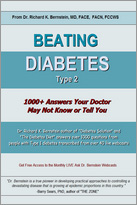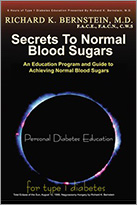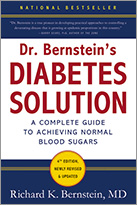J.L.F. is seventy-one years old and has three grandchildren. He still works as a financial consultant, and was a naval aviator in World War II. His blood sugars are currently controlled by diet, exercise, and pills called oral hypoglycemic agents. Thanks to the diet described in this book, his cholesterol/HDL ratio, an index of heart disease risk (see page 51), has dropped from a very high risk level of 7.9 to a below-average level of 3.0. His hemoglobin A1C test, which reflects average blood sugar for the prior four months, has dropped from 10.1 percent (very high) to 5.6 percent (nearly in the nondiabetic range). His R-R interval study (see Chapter 2), an indicator of injury to nerves that control heart rate, has progressed from an initial value of 9 percent variation (very abnormal) to a current value of 33 percent, which is normal for his age.
“I probably had mild diabetes for most of my adult life without realizing it. It first appeared as lethargy, later as fainting, stumbling, or falling, but as rare occurrences. I also had difficulty attaining full erection of my penis.
“In early 1980, I began to experience dizziness, sweating, arm pains, tendencies to fainting, and the symptoms usually associated with heart problems. An angiogram revealed severe disease of the arteries that supplied my heart. I therefore had surgery to open up these arteries. All was well for the next seven years, and I again enjoyed good health.
“In late 1985, I began to notice a loss of feeling in my toes. My internist diagnosed it as neuropathy probably due to high blood sugar. He did the usual blood test, and my blood sugar was 400. His advice was to watch my diet, especially to avoid sweets. I returned for another checkup in 30 days. My blood sugar was 350. Meanwhile, my neuropathy was increasing, along with the frequency of visits. My blood test results were consistently at the 350 level, my feet were growing more numb, and I was becoming alarmed.
“I felt okay physically, walked at least two miles a day, worked out in the gym once or twice a week, worked a full schedule as a business consultant, and didn’t worry a great deal about it. But I did begin to inquire of friends and acquaintances about any knowledge or experience they might have relative to neuropathy or diabetes.
“My first jolt came from a story from one of my friends who had diabetes, foot neuropathy, deep nerve pain in his feet, and a nonhealing ulcer on a toe. He told me that as the neuropathy progressed, amputation of the feet was likely, elaborating by describing the gruesome ‘salami surgery’ of unchecked diabetes.
“That’s when I became emotionally unglued, as they say. One thing about aging and disease, you think a great deal about the utter horror of becoming a cripple, dependent upon others for your mobility. Suddenly foot numbness is no longer a casual matter, more like a head-on crash into reality.
“Then I met a wealthy car dealer at the golf club, with his legs cut off as high as legs go, who explained he hadn’t paid too much attention to his diabetes at the time and his doctor couldn’t help him. He could never leave his chair, except for relief and sleep, and he had to be lifted for that. Oh, he was cheerful enough. He joked that they would cut him off at the middle of his butt the next time, that is, if he didn’t die first. A display of courage to others was a macabre nightmare to me. I got serious about getting someone, somewhere, to tell me what to do about my ever-worsening numbness, which by now had spread to my penis. My condition became an ever-present, gnawing anxiety with me, a creeping presence I couldn’t fight against because I simply didn’t know how to fight it.
“Then, in early April 1986, my wife and I went to visit Dr. Bernstein. The first visit lasted 71/2 hours. Each detail of diagnosis and treatment was discussed. Each symptom of the disease, however minute, was described in great detail, the importance of each balanced with another, with specific remedies for managing them. Take the seemingly insignificant matter of scaly feet, a common, dangerous symptom of diabetes. Dr. B. prescribes mink oil, rubbed into the feet morning and night. Practiced as directed, instead of split skin and running foot sores, you have skin as soft and smooth as velvet. Consider the alternative—feet split, painful, and slow (if at all) to heal—which can change your entire life. Special shoes, debilitating gait, not to mention the horrible possibility of progressive amputation; all things that really can happen if your diabetes is not treated properly.
“What is of highest importance, I believe, is the in-depth explanation of diabetes, its causes, symptoms, and treatment. He gives you the rationale for treatment, so that you have a comprehensive understanding of what is wrong and how it can be corrected.
“First, through frequent finger-stick blood testing, we came to an understanding as to the specifics of how to attack my diabetes. We started with diet. It wasn’t just eat this, don’t eat that, but eat this for these reasons and eat that for other reasons. Know the reasons and the differences. Knowing the how and why of diet keeps you on the track, and the discipline of that knowledge makes control easy. For without continuous diet observance, you will surely worsen your diabetes. He explains that the effect of uncontrolled diabetes on the heart can be much more deleterious than the other popular demons—cholesterol, fat in the diet, stress, tension, et cetera—demons not to be ignored, obviously, but merely put into proper perspective to the main villain—diabetes.
“Well, the results for me are the numbness of my feet and penis have regressed, and my erections have improved. My feet are now beautifully supple and healthy. The severe belching, flatulence, and heartburn after meals have disappeared. The other ills of diabetes have apparently not greatly affected me, and now that I know that controlling my diabetes is the key to a healthy heart, I expect to reduce greatly any future risk of heart attacks.
“One great result of my ability to normalize my blood sugars has been the stabilizing of my emotional attitude toward the disease. I no longer have a sense of helplessness in the face of it; no longer wonder what to do; no longer feel hopelessly dependent on people who have no answers to my problems. I feel free to exercise, walk vigorously, enjoy good health without worry, enjoy my precious eyesight without fear of diabetic blindness, yes, even have a new confidence in normal sexual activities.
“All of the enjoyments of health that were slowly ebbing away are now within my control, and for that I thank my new knowledge and skills.”




